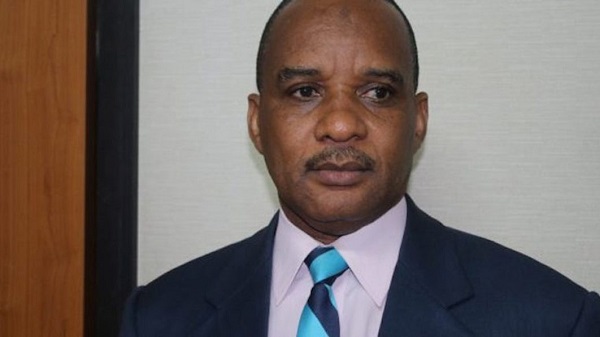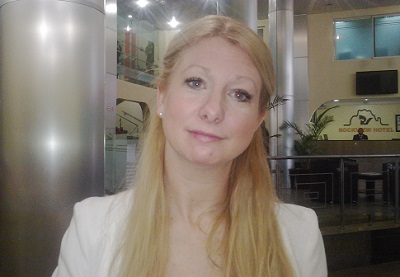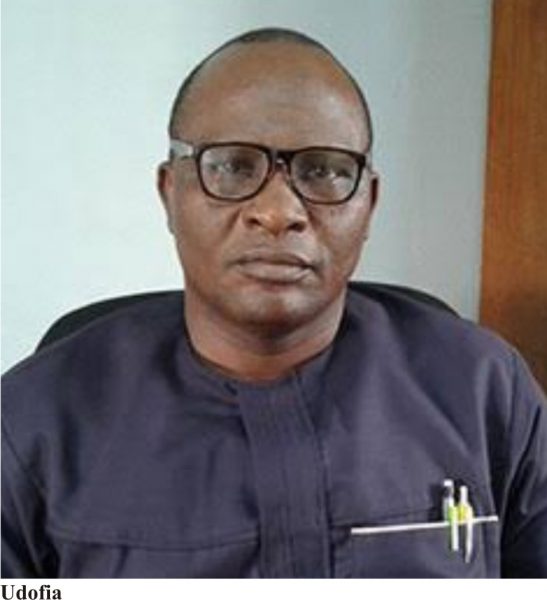How Plane Crash Earned NIMASA GMDSS Approval – Jamoh
By Kenneth Jukpor

Recently, the Director General of the Nigerian Maritime Administration and Safety Agency (NIMASA), Dr. Bashir Jamoh held a media parley to acquaint newmen on the activities at the apex maritime agency. MMS Plus was there to capture his presentation. Excerpts:
Introduction
It gladdens me to see the array of media professionals here today, even though I haven’t seen some of you in months or over a year. I have been reading the issues you write about the industry because I don’t skip them. I must thank you for your ability to raise issues and your approach to handling them in the media. The duty of the media is crucial because it is a service to the people, although sometimes we have cause to complain, we realize that this profession is about educating and enlightening the public.
However, the aspect of investigative reporting and follow-up reporting on certain issues has made us decide that we would inculcate media training into our activities at NIMASA. We should have started this training earlier but for the challenges with COVID-19 pandemic but this problem has reduced now and we can go ahead. We want a situation where maritime professionals and the media are on the same page with regards the understanding of core issues in the industry.
Media Proposal
We want to go through issues with the media and not always have a situation where we introduce issues and the media starts debating if they are right or wrong. Some of our media friends have pointed out that we haven’t been taking them along on so many things and we have to correct that. We just returned from a trip to Cote d’Ivoire for our campaign for Secretary General of the Maritime Organisation for West and Central Africa (MOWCA). The election is next month and we have got assurances from most neighbouring countries on their willingness to support us. We are just waiting for the day and we will try as much as possible to accommodate the media as we progress with this issue.
Over the years, the need for the media to come together and unite themselves has been stressed. The way you’re scattered wouldn’t make it easy to deal with agencies and the government. If I have some slots for press for a trip to the IMO in London, I don’t know who to select or how to go about it. I would be criticized by those who aren’t selected for leaving out one group or another. However, if you’re united you can make the choice among yourselves with an understanding of the criteria and a plan for the group to enjoy the next opportunity. We aren’t only talking about the fiscal gains from traveling but also capacity building, experience and understanding the global standards and approaches in other countries.
I know that the Minister of Transportation, Hon. Rotimi Amaechi made a passionate appeal to the maritime media when he came in, so I will suggest you reconsider that and try to make it work. When you look at the media groups in transport, we have too many but look at the professional groups, we have just two. Chartered Institute of Transport Administration (CIoTA) Nigeria and the Chartered Institute of Logistics and Transport (CILT) Nigeria. Today, CIoTA has the charter recognized by the Nigerian law but we are making talks between CIoTA and CILT to merge so that we can have a united force. We have looked at our strengths and realized that in CIoTA we have more professors and academicians while CILT has quality membership. If CILT brings onboard their quality membership and CIoTA brings their academicians, we would make a good team together. Now, this is my suggestion for the press.
Deep Blue Project
Recently, President Muhammadu Buhari was in Lagos to flag-off the Lagos-Ibadan rail line and the Deep Blue Project, which is a maritime security infrastructure.
When this executive administration came up, we decided to have something unique for the industry and leave a mark that the agency and the industry will appreciate. So, we decided to come up with the tripod ‘S’ strategy; maritime Safety, maritime Security and Shipping development. This executive management and the governing board took it as a challenge to see how to improve quickly on these areas. At the end of the day, we went for the low hanging fruits for the maritime sector.
The first issue we observed was maritime security because we knew that once that was resolved other issues will be easier to handle. So, we concentrated on security and thought about the necessary platforms to guarantee this security and that was the Deep Blue Project. It wasn’t just our idea because the Minister of Transport charged us during the inauguration of the board that we should make sure we completed the Deep Blue Project.
We followed up on the contractors to ensure all the assets were supplied and we deployed them. I’m happy to announce to you that all the assets have been signed, sealed and delivered. These items include land, air and sea assets. These assets include the C4i which has representatives from all the Nigerian security agencies. This helps ensure that we have input from all security outfits when needed and it is the first time to have all security agencies work together for a single purpose. This single purpose is ensuring that maritime security is being addressed.
Apart from the C4i, we have sixteen armoured vehicles that can withstand any weather or creeks. Over 600 trained personnel from the security agencies have been equipped for the Deep Blue Project which has three special mission helicopters and two special mission aircrafts. The kind of response would determine the assets to be deployed. For instance, if there is a need for search and rescue, the helicopters will be more appropriate. We also have unmanned air drones that are automatic and not designed to carry any passengers. The essence of these drones is to check out issues that have to do with over 100 nautical miles from where our special mission vessels or other gadgets are. These drones can send information to the C4i and it has the capacity to travel upto 100km and remain at place for more than 10 hours extracting information for the C4i centre.
Meanwhile, the sea assets are; two special mission vessels that can remain afloat in one place without anchor and they have other special features. They can also extract data from the high seas. We also have seventeen fast interceptor boats that can easily be utilized to react to attacks or incidents that may occur. We have sixteen armoured vehicles and seventeen interceptor boats because we intend to divide them among various parts of the country based on the intelligence report on areas that need them.
The contractor for the Deep Blue Project financed the project, although we signed an agreement to be repaying a certain amount annually until we conclude the payment. We are going to finance this project with our money because it is not a loan. Most of the items came in towards the end of 2020 and we have been utilising them since the President declared the removal of private security operations on the anchorage. We deployed the assets and took charge of the anchorage. Before the deployment of these assets, there were attacks on at least one vessel on a daily basis. After the deployment in December we recorded ten attacks within the Exclusive Economic Zone (EEZ). In January, we recorded just one attack, February had zero attacks, March recorded one attack, in April two attacks, May had one attack and we yet to conclude June.
Extra War Risk Insurance
This issue of the Gulf of Guinea (GoG) has nothing to do with Nigeria because each member country has the responsibility to protect its territory. The biggest problem has to do with integrity because most times we experience attacks that are outside the Nigerian territorial waters but you find the proceeds of such attacks in Nigeria. So, we owe it a duty to address this issue as well as the nation’s foreign policy. We have to see how to extend maritime security beyond the nation’s EEZs and that led us to align with the ICC Yaounde. The essence is to enhance the security in the region, by that agreement Nigeria realized a shared GoG and this was the approach used to solve the piracy at the Gulf of Eden.
Today, we have been celebrated for our efforts with the Deep Blue Project and partnerships with ICC Yaounde. We are also trying to change the stigma given to Nigeria. The nation’s waters have been labeled the most dangerous in the world. This has resulted in the extra war risk insurance.
However, since we have shown a lot of commitment to combat the menace of piracy and invested much in terms of Deep Blue Project assets, the international community should review the war risk insurance premium. We started this campaign the day Mr. President came to inaugurate these assets. We drew the attention of the world to consider withdrawing this war risk insurance premium.
Interestingly, in a recent report from Lloyd’s one of the officials stated that although the organization commends Nigeria for the efforts to tackle piracy, it would continue with the war risk insurance premium. They argued that they have to see more commitment from the Nigerian government before they report the charge. The implication is that the international community is listening to what we are saying and we would continue to respond to them.
One of the questions we continue to ask with respect to war risk insurance, is whether Nigeria is at war. If we collate the issues of piracy and maritime crime in the GoG, you would realize that Nigeria shouldn’t take the entire blame. So, there is a need to rethink the insurance premium. Secondly, they said they want to see more commitment from the government, but the question is – are we benchmarked? Since they commended the progress we have made in some areas, have they gone back to tick some areas where we have made some progress with a view to reduce the insurance premium so that Nigerians wouldn’t continue to suffer from the insurance unduly. There are less than 1,200 criminals involved in this piracy in Nigeria, why should over 200million people have to suffer for it?
As an import dependent country, all these charges collected under war risk insurance have an impact on every Nigerian because we buy products that have been imported. If this insurance is removed, Nigerian citizens would benefit from it and trade would be facilitated in the country. More investors will also be encouraged to play a role in the nation’s shipping trade. Most of the criminal activities in the country would be removed because there will be more employment and Nigerian youths gainfully employed. We will continue to engage the international community and thrive to ensure Nigerian waters are free from the activities of piracy.
SPOMO Act
In June 2019, the President approved the Suppression of Piracy and Other Maritime related Offences (SPOMO) Act and since that time ten criminals have been convicted using the Act. This development has sent strong signals to the criminals that there is no hiding place for them when they are caught. In the past, we arrested these criminals but were unable to prosecute them because of the absence of proper legislation. Some of them were later bailed and found themselves back in the illegal activities. So, we have made progress in terms of prosecuting these criminals.
Maritime Safety
Under maritime safety, I recall that some years ago an aircraft got missing in Nigeria and there was high suspicion that the aircraft must have plunged into the sea. At that time, Mr. Ferdinand Agu was the NIMASA Director General and he was summoned to know if the aircraft crashed into the seas. He told the authorities that NIMASA had approached the Federal Executive Council (FEC) for an approval to commence deployment of Global Maritime Distress and Safety Systems (GMDSS) but it was rejected. He explained that with GDMSS, the agency would have been able to tell when an aircraft or something of that magnitude plunges into the waters. Some months later, the agency submitted another approval and that was how the procurement of this asset began. Today, we have achieved over 70 percent completion of this asset and we hope to complete and commission it in the next few months. We have completed the Takwabay and Kirikiri GMDSS stations and we hope to commission them soonest. With this we would be able to see things that go into the sea. We also have the Oron and Escravos GMDSS stations that are work in progress. The contractors are already in the country to complete these assets.
Nigerian waters have also been described as one of the most dangerous for navigation in terms of wrecks and derelicts. Over the years, the issues have been with the Nigerian laws. The Nigerian Ports Authority (NPA) Act mandates it to remove wrecks within the areas that can lead to the port. The National Inland Waterways Authority (NIWA) Act, under Section 7, also gives the same powers to NIWA to remove wrecks in the coastal and inland waters. Most times, the inland and coastal waters are interpreted to include the seas that bring in ships into the ports. Similarly, under Section 22 of NIMASA Act, the agency has the responsibility to remove wrecks within the Nigerian territorial waters. However, sometime last year, as Chief Executive Officers in the industry we decided to collaborate with each other and agreed that NIMASA can go ahead to remove these wrecks. We commissioned contractors to identify where the wrecks are, the components of the wrecks and match them all over the country so that there is safety in terms of navigation.
We have already commenced the procurement process for the four zones; Badagry- Tin Can Island, Lagos area, Eastern zone in Port Harcourt and the Central zone in Warri. Currently, FEC has approved the contract for the removal of wrecks from Badagry-Tin Can Island axis. So, the navigation of Nigerian waters will be easier and the rating of Nigerian waters as the most dangerous for navigation will no longer be the narrative.
Shipping Development
On shipping development, this has to do with several components which include Marine Environment Management where we have developed our Marine Litters Action Plan that was approved by the International Maritime Organisation (IMO) that also commended us for that action to address the issue of maritime pollution, protection and control.
For our modular floating dock, we have been going back and forth on the project but we have concluded arrangements on where to place the floating dock. However, there is a need to put some things in place before we deploy the floating dock to the location.
With regards to the human element, we recently celebrated the Seafarers Day. A lot of the seafarers that have been trained are working onboard international ships. Their accounts are based in Nigeria and the monies they are being paid is getting back to the Nigerian economy. Apart from the individuals getting the fiscal benefits, it also serves as a sort of foreign exchange for the nation. NIMASA has trained not less than 2,500 seafarers under the Nigerian Seafarers Development Programme (NSDP) which is an intervention programme by the government.
The issue of Cabotage Vessel Finance Fund (CVFF) is also an area where we have recorded a milestone because we have advertised the banks that have interest in the disbursement of the fund. We shortlisted some banks and made some presentations to the Finance Ministry for them to consider the primary lending institutions as enshrined in the law. We have to engage on the guidelines and also deliberate with stakeholders on the kind of vessels we have to procure. I have seen some comments in the last two or three weeks that NIMASA and the Ministry of Transport continue to delay the disbursement. We have waited for several years, but we only have to wait for two or three months.
At this juncture, I want to commend the NIMASA staff that represents the human element that helped drive these developments. To ensure that the members of staff at NIMASA continue to put in their best, within three months of our administration we promoted all those due for promotion and prepared documents to ensure that we review our conditions of service and presented it to the Head of Service.
Today, I’m proud to announce that we have a brand new condition of service approved for NIMASA with enhanced welfare packages for NIMASA staff. We have also prepared a comprehensive review of salaries and we are about to take that for approval and we would continue to look at the welfare of the staff. We would ensure that their salaries are paid as at when due. We would also continue to look at their personal development and improve on professionalism of our staff in line with global best practices.






